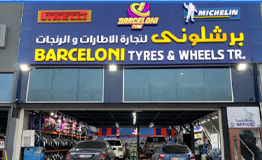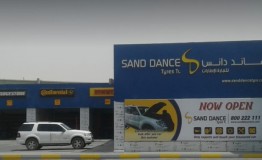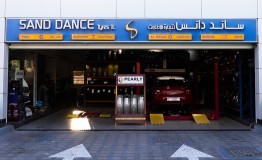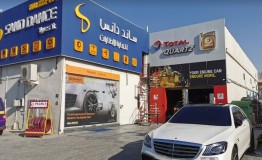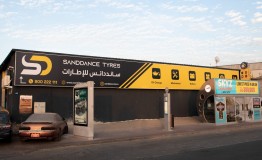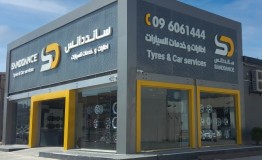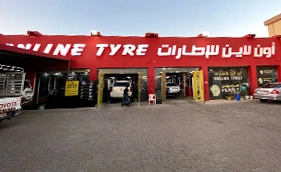How Regular Tyre Balancing Extends Tyre Life and Improves Fuel Efficiency

Maintaining your vehicle in peak condition goes beyond just checking engine oil or brake pads. One critical but often overlooked factor is tyre maintenance. Tyre balancing extends tyre life and can significantly improve your car’s fuel efficiency. Many drivers neglect this simple maintenance step, leading to uneven tyre wear, poor vehicle handling, and increased fuel consumption. In this guide, we explore how regular tyre balancing improves performance, prolongs tyre lifespan, and helps save money over time. What Is Tyre Balancing? Tyre balancing is the process of equalizing the weight distribution around a vehicle’s tyres and wheels. When tyres are unbalanced, certain sections are heavier than others, causing vibrations while driving. These vibrations not only reduce driving comfort but also accelerate tyre wear, reduce fuel efficiency, and strain the suspension system. Professional mechanics use a balancing machine to detect these imbalances and place small weights strategically on the wheel rim. This ensures that the tyre rotates evenly, improving the overall performance of your vehicle. How Tyre Balancing Extends Tyre Life Prevents Uneven Tyre Wear When tyres are unbalanced, specific areas of the tyre endure more pressure than others. Over time, this results in uneven wear patterns. By ensuring tyres are balanced regularly, you distribute the load evenly across the tyre surface. This extends tyre life, allowing your tyres to maintain their structural integrity and traction for longer periods. Reduces Strain on Vehicle Suspension Unbalanced tyres create vibrations that travel to the vehicle’s suspension system. Continuous exposure to these vibrations can damage shocks, struts, and other suspension components, leading to costly repairs. Balanced tyres reduce unnecessary strain, helping your vehicle operate more smoothly and efficiently. Improves Fuel Efficiency An unbalanced tyre increases rolling resistance, meaning your engine has to work harder to move the vehicle. This leads to higher fuel consumption. Maintaining proper tyre balance ensures that tyres roll smoothly, which can improve fuel efficiency and save money at the pump. According to the U.S. Department of Energy, properly maintained tyres can improve fuel economy by up to 3%. Enhances Driving Comfort and Safety Vibrations caused by unbalanced tyres are not only uncomfortable but can also affect steering control. Proper tyre balancing ensures a smoother ride and better handling, particularly at higher speeds. Enhanced control also improves braking performance, making your driving experience safer. Signs Your Tyres Need Balancing Addressing these signs promptly with professional balancing can save money and extend tyre life significantly. Tyre Balancing Frequency: How Often Should It Be Done? While driving conditions vary, most experts recommend balancing your tyres Regular balancing is a small investment that prevents larger, costly repairs in the long run. Tyre Balancing and Tyre Selection Choosing the right tyres is just as important as maintaining them. In the UAE, you can buy tyre online UAE from reliable platforms, comparing prices and reviews conveniently. For instance, Dunlop tyres prices in UAE offer a balance of durability and performance, making them ideal candidates for regular balancing. Best Budget Tyres for Balancing Benefits When selecting budget tyres, consider factors like tread design, durability, and compatibility with your vehicle. Balanced tyres, even budget-friendly options, perform more efficiently and last longer. Some top recommendations include: These tyres paired with proper balancing routines ensure maximum lifespan and fuel efficiency. Fat Tyre E-Bikes vs. Local Garages: Importance of Balancing Balancing is not limited to cars. Fat Tyre E-Bikes vs. Local Garages highlights the importance of balancing even in electric bicycles with heavy tyres. While many riders overlook balancing in E-bikes, uneven tyres reduce battery efficiency and cause faster wear. Local garages often recommend periodic tyre checks to extend tyre life, making maintenance essential across all vehicles. Top 5 Online Tyre Shops in UAE For convenience and competitive pricing, purchasing tyres online is becoming increasingly popular. Here are the top 5 online tyre shops in UAE: Buying tyres from these trusted platforms ensures quality and compatibility with professional balancing services. DIY vs. Professional Tyre Balancing While some car enthusiasts attempt DIY balancing using simple kits, professional balancing is recommended. Modern vehicles require precise calibration to avoid vibrations, uneven tyre wear, and reduced fuel efficiency. Professional services guarantee accurate results using advanced machines and expert techniques. 1. How often should tyres be balanced? Tyres should ideally be balanced every 5,000–6,000 miles, when installing new tyres, or after impacts such as potholes. 2. Can balancing really improve fuel efficiency? Yes, balanced tyres reduce rolling resistance, making your engine work less and saving fuel over time. 3. Are all tyres suitable for balancing? Almost all tyres can be balanced, but high-performance and wider tyres benefit the most from frequent checks. 4. How do I know if my tyre is unbalanced? Signs include steering wheel vibrations, uneven tyre wear, pulling to one side, or tyre noise. 5. Can I balance tyres at home? DIY balancing is possible but not recommended for precision. Professional balancing ensures accuracy and safety. 6. Where can I buy tyres online in UAE? You can buy tyre online UAE at platforms like Etarat, TyresOnline UAE, and TireShopping UAE. Popular brands like Dunlop tyres prices in UAE are available at these stores. Conclusion Regular tyre maintenance is crucial for vehicle performance, and tyre balancing extends tyre life more than many drivers realize. By preventing uneven wear, reducing suspension strain, improving fuel efficiency, and enhancing driving comfort, balanced tyres save both money and hassle over time. Whether you choose to purchase best budget tyres, compare Dunlop tyres prices in UAE, or explore top 5 online tyre shops UAE, pairing your tyres with professional balancing services ensures long-lasting performance. Maintaining tyre balance is a small step with massive long-term benefits, keeping your vehicle safe, fuel-efficient, and smooth on the road.
Top 5 Online Tyre Shops for Quality and Convenience in 2026
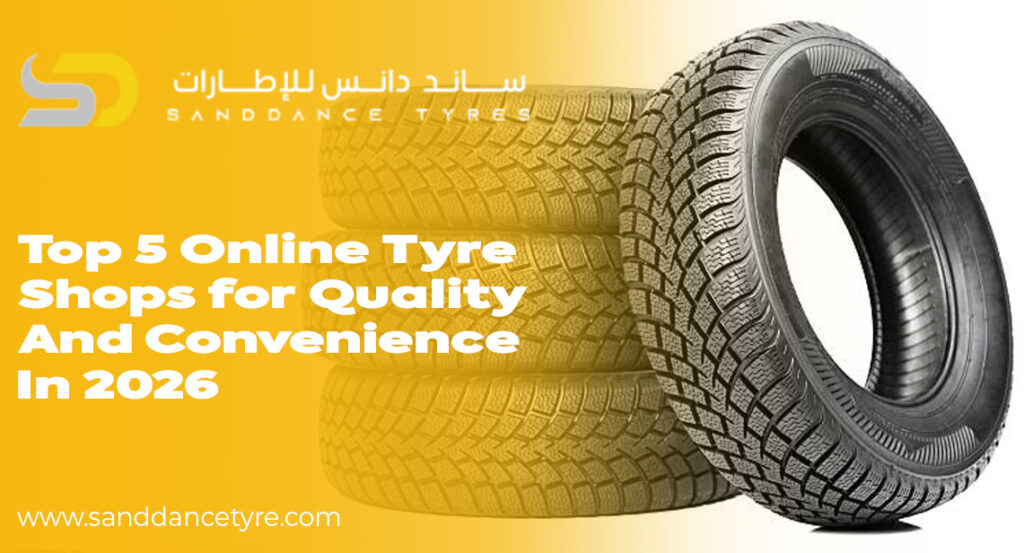
In today’s fast-paced world, finding reliable online tyre shops has become essential for vehicle owners in the UAE. Whether you want to buy tires UAE or compare brands for the best deal, the convenience of online shopping saves both time and effort. This guide highlights the Top 5 Online Tyre Shops in 2026 that provide high-quality products, transparent pricing, and excellent customer service. By the end of this article, you will have the tools to make an informed decision and find the right tyres for your vehicle. Why Choosing the Right Online Tyre Shop Matter Buying tyres online isn’t just about convenience; it’s about safety, performance, and cost-effectiveness. Expert automotive sources emphasize that “tyres directly affect braking efficiency, fuel consumption, and overall driving comfort.” By selecting a reputable online tyre shop, you ensure: Additionally, online platforms often provide comparison tools, allowing you to Compare Tyres Brands and identify the Best Budget Tyres that meet your requirements. What to Look for in Online Tyre Shops Before diving into the list of the Top 5 Online Tyre Shops, consider these essential factors: The Top 5 Online Tyre Shops in 2026 Here’s a detailed look at the Top 5 Online Tyre Shops in the UAE: 1. TyreShop.ae TyreShop.ae is one of the leading online tyre shops in the UAE. Known for its extensive inventory and competitive pricing, it allows customers to buy tires UAE easily. Highlights: Expert Tip: TyreShop.ae’s tyre filter helps you find tyres based on vehicle type, rim size, and price range, making it simple to Compare Tyres Brands effectively. 2. JustTyres UAE JustTyres UAE focuses on convenience and speed. Their platform is user-friendly and allows customers to quickly buy tires UAE with minimal hassle. Highlights: Experience-Based Insight: According to customer reviews, JustTyres UAE delivers within 24-48 hours in major cities, ensuring you get your tyres fast without compromising quality. 3. OnlineTyres.ae As the name suggests, OnlineTyres.ae is fully dedicated to digital tyre shopping. It’s ideal for customers who want to Compare Tyres Brands and explore pricing trends such as Dunlop tyres prices in UAE. Highlights: Pro Tip: Utilize their online chat feature to consult with tyre experts about tyre performance and suitability. 4. TyresOnline UAE TyresOnline UAE has gained a reputation for reliability and variety. Their platform supports multiple tyre brands, helping buyers Compare Tyres Brands quickly. Highlights: Expert Opinion: Industry experts recommend TyresOnline UAE for customers who prioritize safety and certified products over mere pricing. 5. DiscountTyres UAE For budget-conscious buyers, DiscountTyres UAE is an excellent option. It provides Best Budget Tyres without compromising quality. Highlights: Experience-Based Insight: Users report that DiscountTyres UAE often has competitive prices that beat brick-and-mortar stores by 15-20%. Tips to Buy Tyres Online Safely in UAE Shopping online can be overwhelming. Here’s how to ensure a smooth purchase: How to Compare Tyres Brands Effectively When exploring online tyre shops, comparing brands is crucial: Pro Tip: Many platforms provide a “Compare Tyres Brands” feature. Always leverage this tool to ensure you get the right balance of quality and price. FAQs About Online Tyre Shopping in UAE Q1: Can I really buy tyres online in the UAE safely?Yes. Reputable online tyre shops offer genuine products, installation services, and warranties, making online purchases secure. Q2: How do I know the tyre size for my car?Check the sidewall of your current tyres or consult your vehicle’s manual. Online shops like TyreShop.ae also offer compatibility checkers. Q3: Are Dunlop tyres expensive in UAE?Prices vary depending on tyre type. You can find Dunlop tyres prices in UAE online and compare them with other brands to find Best Budget Tyres. Q4: Do online shops offer installation?Most leading platforms partner with local garages for doorstep installation. Confirm before ordering. Q5: What is the benefit of comparing tyre brands online?Comparing allows you to evaluate performance, pricing, warranty, and longevity, ensuring a smarter purchase. Q6: Can I return tyres if they don’t fit?Yes, most online tyre shops provide return policies. Always check the shop’s terms before purchasing. Conclusion In 2026, online tyre shopping in the UAE has become more convenient and trustworthy. The Top 5 Online Tyre Shops listed here—TyreShop.ae, JustTyres UAE, OnlineTyres.ae, TyresOnline UAE, and DiscountTyres UAE—offer a combination of product variety, competitive pricing, and reliable service. By understanding Dunlop tyres prices in UAE, using tools to Compare Tyres Brands, and focusing on Best Budget Tyres, you can make a confident purchase that enhances vehicle safety and performance. Start exploring these platforms today and experience the convenience of buying tyres online without compromising on quality or value.
Fat Tyre E-Bikes vs. Local Garages: Professional Care or Costly Risk?
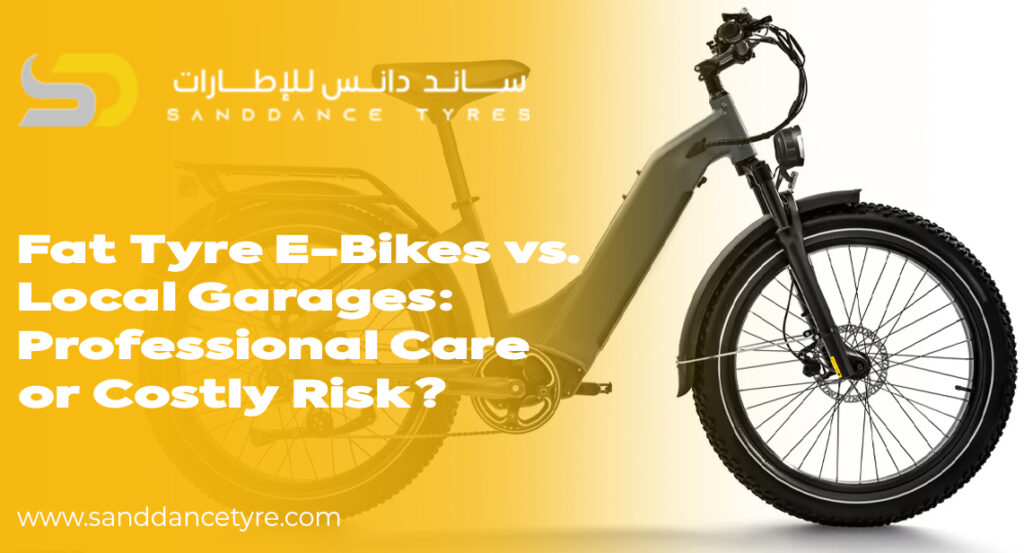
Fat Tyre E-Bikes are changing the way people commute, explore deserts, beaches, and city streets—especially across the UAE. But one common problem riders face is where to get their e-bike serviced. Should you trust local garages, or is professional e-bike care worth the extra cost? If you’ve ever worried about damaging your battery, motor, or fat tyres by choosing the wrong service option, this guide is for you. Right from the start, let’s be clear: choosing the wrong garage can turn a small repair into a costly risk. Below, you’ll get expert-backed insights, real-world experience, and clear comparisons to help you make the safest and smartest decision. Understanding Fat Tyre E-Bikes and Why They Need Specialized Care Fat Tyre E-Bikes are not just bicycles with bigger wheels. They are complex machines combining: Why Fat Tyres Change Everything Fat tyres run at lower air pressure and handle different terrain stresses compared to standard bike tyres. Incorrect mounting, poor alignment, or wrong pressure can lead to: This is where experience matters. The Rise of Local Garages for E-Bike Repairs Why Riders Choose Local Garages Many riders turn to local garages because they are: In regions like the UAE, where automotive garages are everywhere, it’s tempting to assume they can handle e-bikes too. The Hidden Risk Most local garages are designed for cars and motorcycles, not electric bicycles. According to industry technicians, improper handling of e-bike electronics is one of the top causes of long-term damage. “A single wrong voltage test or incorrect wiring can permanently damage an e-bike controller,” — UAE-based e-mobility technician with 8+ years of experience. Professional E-Bike Service vs. Local Garages: A Clear Comparison 1. Tools and Diagnostics 2. Battery Safety Lithium-ion batteries are sensitive to: Professional workshops follow strict safety standards. Many local garages do not. 3. Tyre Expertise Fat tyres require: This level of detail is rarely offered by non-specialized garages. Fat Tyre E-Bikes and Tyre Decisions: What Most Riders Get Wrong Tyres are the only contact point with the road. Choosing poorly affects safety and performance. Common Mistakes Riders Make If you’re planning to buy tires UAE, always check: Compare Tyres Brands: What Actually Works for E-Bikes When riders Compare Tyres Brands, they often focus only on price. Experts recommend balancing budget, terrain, and longevity. Popular Options in the UAE Market For example, many riders researching Dunlop tyres prices in UAE are surprised to learn that some Dunlop models perform better on hybrid e-bikes than off-road fat tyre models. Always match the tyre to your riding style. Can Local Garages Handle Fat Tyre E-Bike Tyres? When It Might Be Okay A local garage may be acceptable for: When It’s a Risk Avoid local garages if the job involves: One mistake can cost more than the original service savings. Cost Breakdown: Cheap Repairs vs. Long-Term Value Service Type Local Garages Professional E-Bike Service Tyre Change Low cost Moderate Battery Safety High risk High safety Motor Handling Limited Expert Warranty Impact Void risk Protected Long-Term Cost Higher Lower Cheap today often means expensive tomorrow. Expert Advice: When to Choose Professional Care Choose professional service if: Professional care protects both performance and resale value. Local Garages Aren’t Always the Enemy—But Know the Limits Not all local garages are bad. Some skilled mechanics can handle basic mechanical work. The key is knowing the limits. Rule of thumb: If electricity, battery, or motor is involved—go professional. The UAE Factor: Climate, Terrain, and Wear The UAE’s: …accelerate wear on tyres and electronics. This makes professional servicing even more critical for Fat Tyre E-Bikes. Final Verdict: Professional Care or Costly Risk? For Fat Tyre E-Bikes, local garages can save you money only for very minor tasks. For anything technical, electrical, or safety-related, professional service isn’t a luxury—it’s a necessity. If you truly want: Professional care wins. Every time. Frequently Asked Questions (FAQs) 1. Can local garages safely repair Fat Tyre E-Bikes? Local garages can handle basic mechanical tasks, but they often lack the tools and expertise for electrical and battery-related repairs. 2. Are Fat Tyre E-Bikes more expensive to maintain? Not necessarily. With professional servicing and the right tyres, maintenance costs remain predictable and manageable. 3. How often should fat tyres be replaced? On average, every 2,000–4,000 km, depending on terrain, riding style, and tyre quality. 4. Is it safe to buy budget tyres for e-bikes? Yes, Best Budget Tyres can be safe if they meet load and heat resistance standards suitable for e-bikes. 5. Should I compare tyre brands before buying? Absolutely. Riders who Compare Tyres Brands 2026 often find better durability and value for money. 6. Where should I buy tyres in the UAE? When planning to buy tires UAE, choose reputable sellers that understand e-bike requirements and local riding conditions.
All-Season vs Summer Van Tyres: Which Option Suits Your Driving Needs?
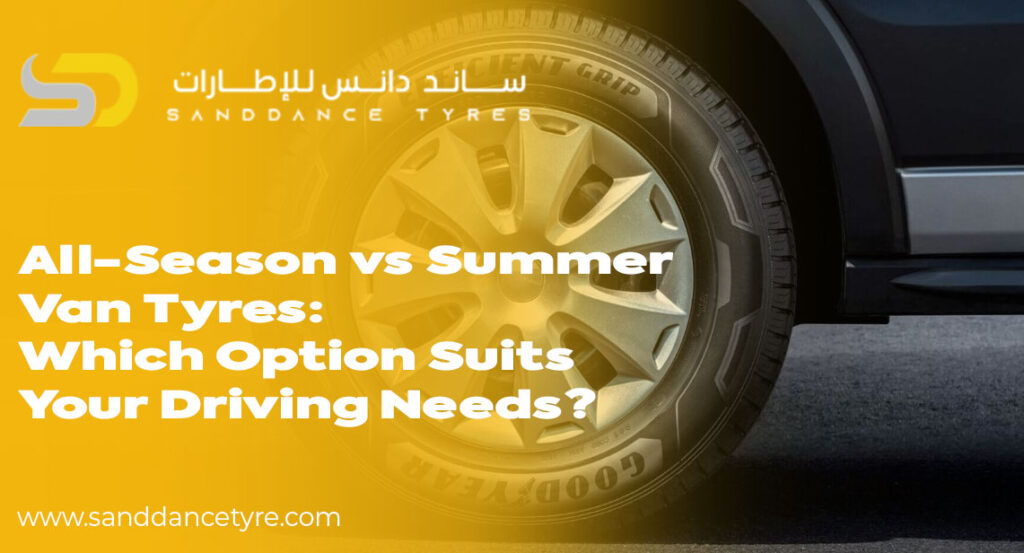
Choosing the right tyres for your van directly affects safety, fuel efficiency, load handling, and long-term costs. Many van owners and fleet managers struggle to decide between Season vs Summer Van Tyres, especially when driving conditions, weather, and usage vary throughout the year. If you’re unsure which option fits your needs, this guide will solve that confusion right away. In simple terms, Season vs Summer Van Tyres comes down to climate, driving style, and load requirements. Summer tyres excel in hot conditions and dry roads, while all-season tyres offer year-round versatility. Below, we’ll break down the differences with expert insights, real-world experience, and practical tips—so you can confidently choose the best van tyres for your driving needs. Understanding Van Tyres and Why the Right Choice Matters Van tyres are specifically designed to handle heavier loads, higher mileage, and longer operating hours than regular car tyres. Unlike passenger tyres, they feature reinforced sidewalls and higher load ratings to support cargo and commercial use. From delivery vans to service vehicles, choosing the wrong tyre type can result in: This is why understanding the Season vs Summer Van Tyres debate is essential before you buy. What Are Summer Van Tyres? Designed for Hot and Dry Conditions Summer van tyres are engineered to perform best in warm temperatures, typically above 7°C (45°F). They use a harder rubber compound that maintains stability and grip in high heat. Key Features of Summer Van Tyres Expert Insight Tyre manufacturers like Dunlop and Michelin design summer tyres specifically for regions with extended hot seasons. According to industry testing, summer tyres can reduce braking distance by up to 20% on dry roads compared to all-season alternatives. What Are All-Season Van Tyres? Versatility for Year-Round Use All-season van tyres are a hybrid solution, combining features of summer and winter tyres. They are ideal for drivers who experience moderate seasonal changes but don’t want the hassle of changing tyres twice a year. Key Features of All-Season Van Tyres Experience-Based Insight For urban delivery drivers who cover consistent routes year-round, all-season tyres provide reliable performance without frequent maintenance downtime. Season vs Summer Van Tyres: A Direct Comparison Performance Differences Feature Summer Van Tyres All-Season Van Tyres Hot Weather Grip Excellent Good Wet Road Handling Excellent Moderate Cold Weather Use Poor Fair Fuel Efficiency Higher Moderate Longevity in Heat Longer Shorter In hot regions like the Middle East, summer tyres often outperform all-season tyres in durability and safety. Climate Considerations: UAE and Similar Regions If you drive in extreme heat for most of the year, the Season vs Summer Van Tyres debate becomes much clearer. In places like the UAE, road temperatures can exceed 60°C, which quickly degrades all-season rubber compounds. This is why many experts recommend summer van tyres when you plan to buy tires UAE, as they are better suited to withstand intense heat without compromising performance. Load Capacity and Commercial Usage Why Load Rating Matters Van tyres must handle higher loads than standard tyres. Summer tyres often provide: All-season tyres can handle loads well but may wear faster under continuous heavy-duty use. Fuel Efficiency and Cost Savings Summer van tyres generally have lower rolling resistance, which means: For fleet owners, even a 3–5% fuel efficiency improvement can translate into significant annual savings. Compare Tyres Brands for Van Use When comparing brands, it’s important to consider performance, warranty, and regional suitability. Popular Van Tyre Brands Many buyers researching dunlop tyres prices in uae find them competitively priced for summer tyre performance, especially for commercial vans. When Should You Choose Summer Van Tyres? Choose summer tyres if: For most commercial drivers in hot regions, summer tyres are the clear winner in the Season vs Summer Van Tyres comparison. When Are All-Season Van Tyres the Better Option? All-season tyres may suit you if: They are especially useful for small businesses operating across regions with varied weather. Tips for Choosing the Right Tyres for Your Car or Van Although vans have unique requirements, the same fundamentals apply as choosing tyres for any vehicle. Practical Buying Tips Whether you’re upgrading van tyres or planning to buy tires UAE, making an informed decision ensures safety and long-term value. Maintenance Tips to Extend Tyre Life Regardless of tyre type: Proper maintenance can extend tyre life by 20–30%, according to automotive service studies. Final Verdict: Season vs Summer Van Tyres There’s no one-size-fits-all answer, but the decision becomes simple when you align tyre choice with your driving environment. For hot climates and heavy commercial use, summer tyres deliver superior performance, safety, and cost efficiency. All-season tyres, on the other hand, offer flexibility for drivers facing variable conditions. Understanding Season vs Summer Van Tyres empowers you to protect your vehicle, your cargo, and your budget—mile after mile. Frequently Asked Questions (FAQs) 1. Are all-season van tyres suitable for UAE weather? All-season tyres can be used, but summer tyres perform better in extreme heat commonly found in the UAE. 2. How often should van tyres be replaced? Most van tyres last between 40,000–70,000 km, depending on load, road conditions, and maintenance. 3. Do summer van tyres wear faster? In hot climates, summer tyres often last longer than all-season tyres due to heat-resistant compounds. 4. Can I mix summer and all-season tyres on my van? It’s not recommended, as mixed tyres can affect handling and braking balance. 5. Are premium tyre brands worth the price? Yes, premium brands often offer better durability, safety testing, and warranties. 6. What should I check before buying van tyres? Always check size, load index, speed rating, manufacturing date, and regional suitability.
Best Tyres for Hot Weather Driving: Top Picks and Buying Guide
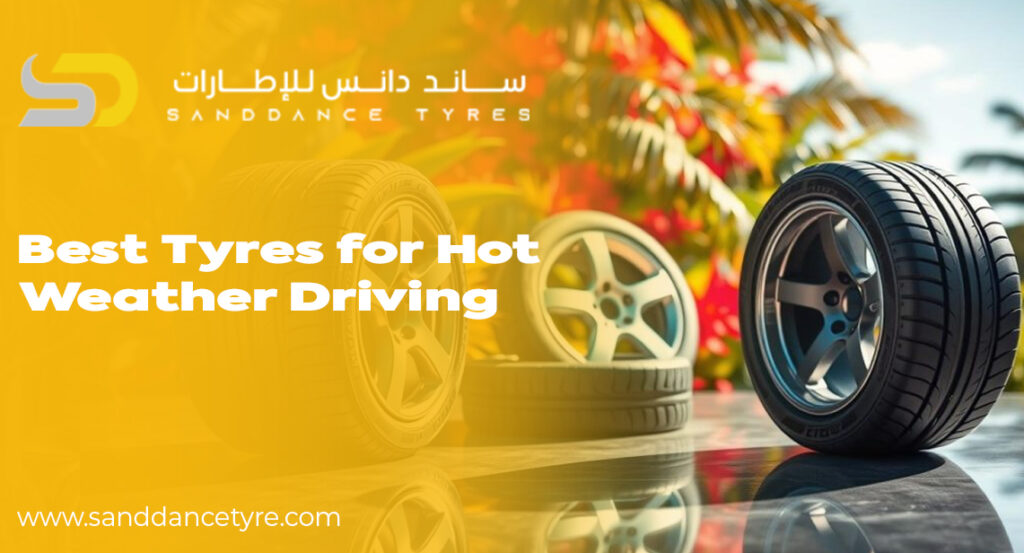
When it comes to driving in scorching temperatures, choosing the Best Tyres for Hot Weather is crucial for safety, performance, and durability. Extreme heat can cause tyres to wear faster, lose grip, and even risk blowouts if the wrong type is used. Hot weather tyres are designed to maintain optimal traction on asphalt, resist heat-related damage, and provide a smoother driving experience during the summer months. Whether you’re navigating city streets or taking long highway journeys, investing in the right tyres ensures your vehicle remains safe and efficient under high-temperature conditions. Why Hot Weather Tyres Are Important Hot weather tyres are specifically engineered to withstand high temperatures, which can significantly affect a vehicle’s handling and braking performance. Traditional tyres may soften in the heat, reducing grip and increasing the chances of skidding. On the other hand, tyres designed for hot climates use specialized rubber compounds and tread patterns to: For drivers in regions like the UAE, Australia, or parts of the U.S., using tyres optimized for hot conditions is not just a matter of performance—it’s a safety necessity. Key Features of the Best Tyres for Hot Weather When choosing tyres for hot weather, several features are crucial to consider: Top 5 Best Tyres for Hot Weather in 2025 Here’s a curated list of some of the best tyres for hot weather, offering reliability, grip, and durability: 1. Michelin Pilot Sport 4 2. Bridgestone Potenza RE-71R 3. Pirelli P Zero 4. Continental ContiSportContact 5 5. Yokohama ADVAN Sport V105 Tips for Maintaining Hot Weather Tyres Even the best tyres require proper maintenance to ensure longevity and safety in hot conditions. Here are some essential tips: Benefits of Investing in Hot Weather Tyres Using tyres designed for hot climates comes with numerous benefits: How to Choose the Right Tyre for Your Vehicle When selecting the Best Tyres for Hot Weather, consider the following: Common Myths About Hot Weather Tyres Conclusion Selecting the Best Tyres for Hot Weather is vital for safe and efficient driving in high-temperature regions. From performance and durability to comfort and fuel efficiency, the right tyres significantly impact your vehicle’s overall performance. Consider your vehicle type, driving style, and budget when choosing tyres, and always maintain them properly for maximum longevity and safety. FAQs Q1: Can I use regular tyres in hot weather? A1: Regular tyres may work temporarily, but they are not optimized for extreme heat, leading to faster wear, reduced grip, and a higher risk of blowouts. Q2: How often should I check tyre pressure in summer? A2: Ideally, check tyre pressure at least once a week during hot months, as heat increases pressure and can affect performance. Q3: Are summer tyres better than all-season tyres for heat? A3: Yes, summer tyres are specifically designed for high temperatures, offering better grip, handling, and durability compared to all-season tyres. Q4: Can hot-weather tyres handle occasional rain? A4: Yes, most high-quality hot weather tyres have tread patterns that handle wet roads efficiently, but performance is best on dry asphalt. Q5: How long do hot weather tyres last? A5: With proper maintenance, they typically last 40,000–60,000 km, depending on driving style, road conditions, and tyre brand.
On-the-Spot Flat Tyre Repair Dubai Call Anytime – Fast & Reliable Help
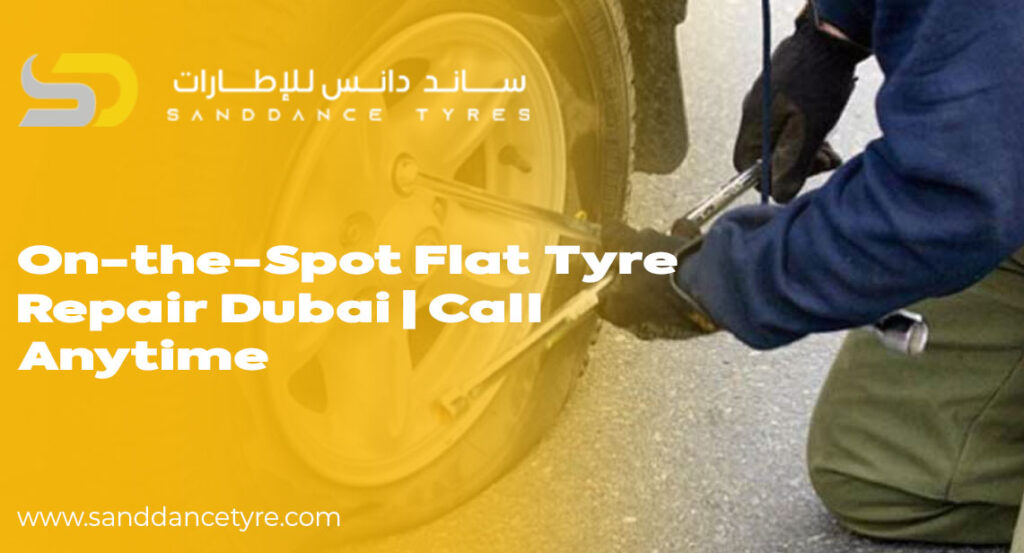
A sudden tyre puncture in the middle of Dubai traffic or late at night can be stressful and unsafe. Flat Tyre Repair Dubai services are designed to solve this problem immediately—wherever you are, whenever it happens. Instead of waiting hours for towing or risking driving on a damaged tyre, on-the-spot professionals reach your location, inspect the issue, and repair or replace the tyre within minutes. This guide explains how on-site services work, why they’re trusted across the UAE, and how to make smarter tyre choices to avoid future breakdowns. Why Flat Tyre Repair Dubai Services Matter Dubai’s roads are fast, wide, and often busy 24/7. A flat tyre isn’t just inconvenient—it can quickly become dangerous. Based on real roadside experience, most tyre failures happen due to: Professional Flat Tyre Repair Dubai teams handle these scenarios daily. With mobile vans fully equipped, they can safely repair punctures, replace valves, balance wheels, or install a spare tyre on the spot—saving you time and stress. How On-the-Spot Tyre Repair Works in Dubai 1. Call Anytime, Anywhere Most providers operate 24/7. Whether you’re stuck at home, office, mall parking, or highway shoulder, help is just one call away. 2. Quick Diagnosis Technicians assess whether the tyre can be repaired or needs replacement. Minor punctures are fixed immediately; sidewall damage usually requires a new tyre. 3. Instant Repair or Replacement Using professional tools, they perform safe repairs that meet UAE road standards. Many also carry popular tyre brands if replacement is needed. This is why Tyre Repair Dubai mobile services are preferred over traditional workshops—they bring the solution to you. Common Tyre Problems Fixed On-Site Puncture Repairs Small nail or screw punctures in the tread area are safely patched or plugged. Valve & Air Leak Fixes Slow leaks often come from faulty valves or rim corrosion—quick fixes prevent repeated flats. Spare Tyre Installation If repair isn’t possible, technicians install your spare and advise next steps. Battery & Minor Roadside Support Many Tyre Repair Dubai providers also assist with jump starts and basic roadside needs. Is Mobile Tyre Repair Safe and Reliable? Yes—when done by trained professionals. Reputable companies follow manufacturer and RTA safety guidelines. From experience, a properly repaired puncture can last the full life of the tyre if: This practical, experience-based approach is why mobile Flat Tyre Repair Dubai services are widely trusted. When You Should Replace Instead of Repair Even the best Tyre Repair Dubai expert will recommend replacement if: In such cases, technicians often help you buy tires UAE directly from trusted suppliers, saving you another trip. Buying New Tyres in the UAE: What You Should Know Compare Tyres Brands Before Buying Not all tyres perform the same in Dubai’s heat. Always Compare Tyres Brands based on: Popular choices in the UAE include Bridgestone, Michelin, Yokohama, and Dunlop. Dunlop Tyres Prices in UAE Many drivers ask about Dunlop tyres prices in UAE because they offer a balance of durability and affordability. Prices vary by size and model, but they are often competitive compared to premium European brands. Buy Tires UAE – Convenience Matters Modern mobile services let you buy tires UAE directly during roadside assistance. This is ideal if your tyre is beyond repair and you need an immediate solution. Tips for Choosing the Right Tyres for Your Car Choosing the right tyres reduces breakdowns and improves safety. Based on expert recommendations and real driving conditions, follow these Tips for Choosing the Right Tyres for Your Car 1. Match Tyre Size Exactly Always follow the manufacturer’s recommended size for safety and handling. 2. Check the Speed & Load Rating Dubai highways demand tyres rated for high speeds and heavy loads. 3. Consider Driving Conditions City driving, long highway commutes, or off-road trips require different tread designs. 4. Look at Manufacturing Date Avoid tyres older than 12 months when buying new. 5. Balance Price with Quality The cheapest option isn’t always safest—value comes from durability and grip. Why 24/7 Tyre Repair Dubai Is Better Than Towing Towing can take hours and cost more than the repair itself. With mobile Tyre Repair Dubai: From experience, most flat tyres are repaired within 20–30 minutes on-site. Cost of Flat Tyre Repair in Dubai Prices depend on: However, on-the-spot repair is usually far more affordable than towing plus workshop charges. Expert Advice to Avoid Future Flat Tyres Professionals recommend: Final Thoughts Whether you’re commuting daily or driving late at night, Flat Tyre Repair Dubai services offer peace of mind. With fast response times, expert handling, and the option to repair or replace tyres instantly, they eliminate the stress of roadside breakdowns. Combine this with smart tyre choices—compare brands, understand Dunlop tyres prices in UAE, and follow expert tyre care tips—and you’ll stay safer on Dubai’s roads year-round. Following these tips reduces your chances of needing emergency Flat Tyre Repair Dubai. Frequently Asked Questions (FAQs) 1. How fast is on-the-spot flat tyre repair in Dubai? Most technicians arrive within 30–45 minutes, depending on traffic and location. 2. Is tyre repair safe for highway driving? Yes, if the puncture is minor and repaired professionally according to safety standards. 3. Can you repair tyres at night or early morning? Yes, 24/7 Tyre Repair Dubai services operate round the clock. 4. When should I replace instead of repair a tyre? If the sidewall is damaged, the tyre is old, or the tread depth is unsafe. 5. Can I buy new tyres during roadside assistance? Yes, many services allow you to buy tires UAE directly on the spot. 6. Are Dunlop tyres a good choice in Dubai? Yes, many drivers choose them due to competitive Dunlop tyres prices in UAE and reliable performance in hot climates.
Why Choosing the Right Tyre Brand Matters in the UAE
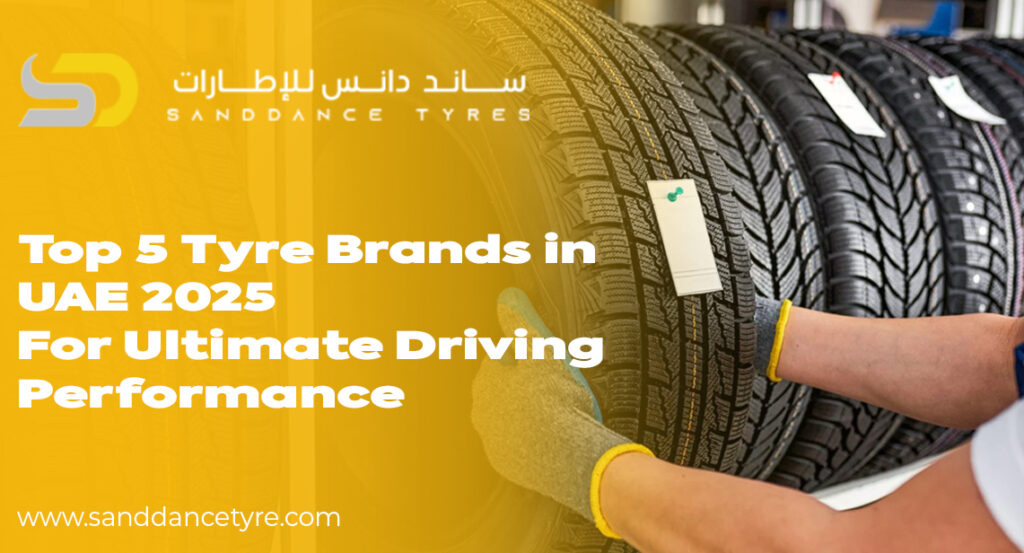
UAE Climate and Road Conditions The UAE’s extreme heat accelerates tyre wear, increases blowout risks, and tests rubber compounds like nowhere else. A tyre that performs well in Europe may fail miserably on Sheikh Zayed Road in August. Safety, Performance, and Fuel Efficiency High-quality tyres improve braking distance, enhance cornering stability, reduce road noise, and even lower fuel consumption. In short, the right tyre saves money and lives. How We Selected the Top 5 Tyre Brands in UAE 2025 Performance in Extreme Heat Heat resistance was non-negotiable. Only brands proven to perform in high-temperature environments made the list. Durability and Longevity Frequent tyre changes hurt your wallet. We focused on brands known for long tread life. Availability and Service Network Easy availability across Dubai, Abu Dhabi, Sharjah, and other emirates was essential. Value for Money Premium doesn’t always mean overpriced. We balanced performance with real-world affordability. Top 5 Tyre Brands in UAE 2025 – Quick Overview Let’s break them down one by one. Michelin – Premium Performance and Comfort Why Michelin Dominates UAE Roads Michelin continues to lead the pack in 2025. Known for advanced rubber technology, Michelin tyres handle heat like a pro while delivering whisper-quiet comfort. Best Michelin Tyres for UAE Drivers Pros and Cons of Michelin Tyres Pros Cons Bridgestone – Reliability Meets Innovation Bridgestone’s Strength in Hot Conditions Bridgestone tyres are engineered for durability. If you’re the kind of driver who clocks serious mileage, Bridgestone has your back. Popular Bridgestone Tyres in UAE Pros and Cons of Bridgestone Tyres Pros Cons Goodyear – Smart Choice for Everyday Driving Goodyear Tyres for UAE City & Highway Use Goodyear strikes a sweet balance between price and performance, making it a favorite among daily commuters. Best Goodyear Tyres in UAE Pros and Cons of Goodyear Tyres Pros Cons Continental – German Engineering for UAE Roads Continental’s Focus on Safety and Handling Continental tyres are all about precision. Think razor-sharp steering response and excellent braking performance. Top Continental Tyres in UAE Pros and Cons of Continental Tyres Pros Cons Pirelli – Performance and Luxury Driving Why Pirelli is Popular Among Sports Car Owners Pirelli is the go-to choice for luxury and sports vehicles. If performance driving excites you, this brand delivers adrenaline. Best Pirelli Tyres for UAE Pros and Cons of Pirelli Tyres Pros Cons Comparison Table: Top 5 Tyre Brands in UAE 2025 Brand Best For Price Range Heat Resistance Michelin Comfort & longevity High Excellent Bridgestone Durability Medium–High Very Good Goodyear Daily driving Medium Good Continental Safety & handling High Very Good Pirelli Performance cars High Excellent How to Choose the Best Tyre Brand for Your Car in UAE Based on Driving Style Based on Budget Set a budget but don’t compromise on safety. Mid-range tyres often deliver excellent value. Based on Vehicle Type SUVs, sedans, and sports cars all demand different tyre characteristics. Where to Buy Original Tyres in UAE Online Tyre Stores Online platforms offer convenience, competitive prices, and home installation. Authorized Dealers Ideal for peace of mind, warranty support, and professional fitting. Conclusion The Top 5 Tyre Brands in UAE 2025 prove that not all tyres are created equal. Whether you value comfort, performance, durability, or budget-friendliness, there’s a perfect match waiting for your car. Invest wisely because in the UAE, your tyres work harder than anywhere else. FAQs Which tyre brand lasts longest in UAE? Michelin is widely known for the longest tread life in UAE conditions. Are expensive tyres worth it in the UAE? Yes, premium tyres offer better heat resistance, safety, and longevity. Which tyre is best for UAE highways? Bridgestone and Continental perform exceptionally well on highways. How often should tyres be replaced in UAE? Typically every 40,000–60,000 km, depending on driving habits. Can I buy tyres online in UAE? Yes, many trusted online tyre stores offer installation at your location.
How to Check Tyre Year: A Complete Guide for Safe Driving
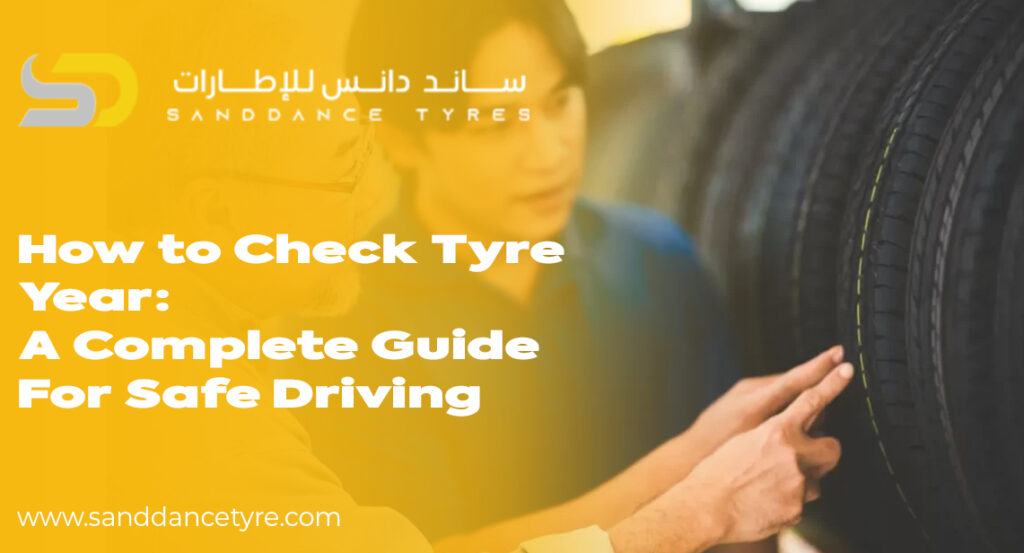
Knowing the age of your tyres is essential for road safety, vehicle performance, and legal compliance. Many drivers are unaware that tyres have a limited lifespan, and using old or expired tyres can lead to accidents, poor handling, or reduced fuel efficiency. In this guide, we’ll explain how to check tyre year, understand tyre expiry dates, and identify the right tyres for your vehicle. Why Knowing Your Tyre Manufacturing Date Matters What Is Tyre Expiry and Why It’s Important Tyres are made from rubber compounds that degrade over time. Even if a tyre has good tread depth, it may still be unsafe if it’s past its expiry date. Most tyre manufacturers recommend replacing tyres after 5–6 years, regardless of use. Checking the tyre manufacturing date helps you avoid accidents caused by aged tyres. How Tyre Age Affects Safety and Performance Old tyres can cause: Tyre Expiry Regulations in Fujairah Some countries enforce strict tyre expiry regulations. For example, in the UAE, tyres older than 10 years are considered unsafe, even if they appear new. Always check local regulations when buying or replacing tyres. How to Find the Tyre Manufacturing Date Understanding the DOT Code on Tyres Every tyre sold worldwide has a DOT (Department of Transportation) code stamped on its sidewall. This code contains vital information about the tyre’s manufacturer, plant, and most importantly, its manufacturing date. How to Read the Last Four Digits of DOT Code The last four digits of the DOT code indicate the week and year of manufacture: For example, a DOT ending in 2319 means the tyre was made in the 23rd week of 2019. Other Markings That Indicate Tyre Manufacturing Date Some tyres also display additional markings, such as ISO codes or batch numbers. While not as straightforward as the DOT code, these can be referenced with manufacturer guides. Tools and Apps to Check Tyre Year Easily Several mobile apps and online tools allow you to scan the DOT code and quickly identify the tyre manufacturing date. These are particularly useful for used tyre buyers. How to Identify Tyre Type and Features What Tyre Type Is Best for Your Vehicle? Tyres are designed for specific conditions and vehicles. Knowing what tyre suits your car ensures safety and better performance. Common types include: How to Identify Radial Tyres and Their Benefits Most modern cars use radial tyres, which have layers running radially from the centre. They are identifiable by the letter “R” in the tyre size (e.g., 205/55 R16). Radial tyres offer: Understanding Tyre Sidewall Markings Tyre sidewalls include information about: Reading sidewall markings helps you identify radial tyres and understand your tyre’s specifications. You May Also Read These Tyre Expiry and Replacement Guidelines How Long Do Tyres Last? Even with minimal use, tyres generally last 5–6 years from the manufacturing date. High-performance or soft-compound tyres may degrade faster. Signs Your Tyres Have Expired or Worn Out Look for these signs: Choosing the Right Replacement Tyres in Ajman When replacing tyres in Ajman, choose a trusted tyre shop that sells tyres with visible DOT codes. Always check the manufacturing date before purchase. Frequently Asked Questions About Tyre Age Can Old Tyres Be Used Safely? Tyres older than 6 years may still function but are considered unsafe, especially under heavy loads or high-speed driving. How Often Should Tyres Be Checked for Expiry? Inspect tyres every 6–12 months. Check the DOT code, tread depth, and sidewall condition. Is There a Difference Between Tyre Manufacturing Date and Tyre Expiry Date? Yes. The manufacturing date tells you when the tyre was made, while the expiry date indicates when it should no longer be used for safety reasons. Conclusion: Stay Safe by Regularly Checking Your Tyre Year Quick Tips to Remember Tyre Age and Expiry Recommended Tyre Maintenance Practices Regularly checking how to check tyre year ensures you drive safely, reduce risks of accidents, and maximize tyre life. Make tyre inspection a routine part of your car maintenance schedule.
Automechanika Dubai 2025: Must-See Highlights from the Trending Auto Event

Automechanika Dubai 2025 is set to be one of the most influential automotive trade shows in the region, attracting industry professionals, manufacturers, and car enthusiasts from around the world. As the Middle East’s largest automotive aftermarket exhibition, Automechanika Dubai 2025 promises advanced technologies, global exhibitors, and exciting innovations that showcase the future of mobility in Dubai. Why Automechanika Dubai Matters for the Automotive Sector Automechanika Dubai has grown into a cornerstone event for the automotive aftermarket and service industry. Every year, it brings together distributors, suppliers, OEM manufacturers, garage owners, workshop professionals, and technology innovators. The show acts as a global bridge between Asia, Europe, Africa, and the Middle East—making Dubai the ultimate center for automotive trade. For businesses in Dubai, this event is more than an exhibition. It is a platform to explore partnerships, discover new technologies, learn about global market trends, and grow their presence in the booming regional automotive market. What to Expect at Automechanika Dubai 2025 Automechanika Dubai 2025 is expected to feature expanded halls, more product categories, live demonstrations, and future-focused innovations. Attendees can expect to explore everything from advanced workshop tools to electric mobility solutions and aftermarket services. This year’s theme strongly emphasizes sustainability, digitization, and the shifting landscape of vehicle maintenance. Whether you’re from the car care industry, fleet management, spare parts business, or automotive technology field, the event provides unmatched insights into current and future market opportunities. Major Highlights of the Automechanika Dubai Experience 1. Global Exhibitors from Across the Automotive Supply Chain Automechanika Dubai welcomes thousands of exhibitors from more than 60 countries, showcasing their products across dedicated zones. Expect to meet manufacturers and suppliers specializing in: This multi-sector presence makes the exhibition extremely valuable for business growth and networking. 2. Cutting-Edge Automotive Innovation The event is known for introducing groundbreaking ideas that shape the future of transportation. In 2025, innovation will remain a focal point with technologies such as: Industry professionals visiting Automechanika Dubai can witness these innovations firsthand and understand how they can implement them in their businesses. 3. A Dedicated EV & Future Mobility Zone With Dubai’s growing focus on smart and sustainable transportation, Automechanika Dubai has expanded its EV and Future Mobility Zone. This section spotlights: This is especially relevant for Dubai, where EV adoption is on the rise and businesses are adapting to new market demands. 4. Expert-Led Workshops & Technical Training Sessions One of the core strengths of Automechanika Dubai is its lineup of knowledge-sharing sessions. Attendees can benefit from: These sessions are crucial for workshop owners, mechanics, and automotive service providers who want to keep up with emerging technologies and skills. 5. The Automechanika Academy The Automechanika Academy remains a major attraction—bringing together industry experts, CEOs, engineers, and policymakers for panel discussions. Topics often include: This academy is a knowledge hub for anyone wanting to understand industry direction or refine business strategies. You May Also Read These Industries & Professionals Who Must Attend Automechanika Dubai attracts a wide range of participants, making it a versatile platform for collaboration. Those who benefit most include: For Dubai-based automotive businesses, attending the event can lead to valuable partnerships and insights that support long-term growth. Why Dubai Is the Perfect Host for Automechanika Dubai is known for its strong logistics infrastructure, thriving automotive import-export market, and future-focused smart mobility initiatives. With world-class exhibition venues and connectivity, the city makes the perfect destination for a global event like Automechanika. Key advantages include: This environment fosters growth opportunities for exhibitors and visitors alike. Tips to Make the Most of Automechanika Dubai 2025 To maximize your visit: Planning ensures that you experience the event efficiently and gain maximum value from your visit. Expected Trends at Automechanika Dubai 2025 Industry experts predict that this year’s show will emphasize: These trends highlight the shift toward smarter, cleaner, and more efficient automotive systems in Dubai and the broader region. Conclusion Automechanika Dubai 2025 is more than an exhibition—it is the heart of the automotive aftermarket in the Middle East. From innovative technologies to global exhibitors and expert-led conferences, this event offers unmatched value for industry professionals in Dubai. Whether you are looking to expand your business, learn new skills, or explore the future of mobility, Automechanika Dubai remains the must-attend auto event of the year. FAQs 1. What is Automechanika Dubai 2025? It is the Middle East’s largest automotive aftermarket exhibition, showcasing global suppliers, tools, technologies, and innovations in the automotive sector. 2. Who should attend Automechanika Dubai? Business owners, workshop professionals, mechanics, spare parts dealers, fleet managers, tyre suppliers, and anyone in the automotive industry. 3. Where is Automechanika Dubai held? It is held at the Dubai World Trade Centre (DWTC), one of the city’s premier exhibition venues. 4. What can visitors expect at the event? Visitors can explore exhibitors, attend workshops, see live demonstrations, and discover cutting-edge automotive innovations. 5. Does the event focus on electric vehicles? Yes, the EV & Future Mobility Zone highlights EV technologies, charging systems, and sustainable automotive solutions. 6. Can businesses find new suppliers at Automechanika Dubai? Absolutely. The event hosts thousands of exhibitors offering spare parts, workshop tools, car care products, accessories, and much more.
Best Tyre Brands for UAE Roads: Performance, Durability & Value Compared

Driving in the UAE comes with unique challenges. From the scorching heat of the desert to city roads with heavy traffic, your vehicle faces constant wear and tear. Choosing the right tyres is crucial to ensure safety, performance, and long-term durability. Along with reliable tyres, having proper car insurance adds an extra layer of protection on UAE roads. In this guide, we’ll explore the best tyre brands for UAE roads and how to maximize your driving experience through the right tyres and insurance. Why Choosing the Right Tyres Matters in the UAE Tyres are the only contact point between your car and the road, which makes them the most critical factor for safety, comfort, and performance. Here are some reasons why choosing the right tyre brand is important for UAE drivers: Types of Tyres Available for UAE Roads When buying tyres in the UAE, you’ll notice multiple options depending on your driving needs. Choosing the right type of tyre ensures maximum efficiency and safety. 1. All-Season Tyres All-season tyres are versatile and suitable for both city driving and moderate off-road conditions. They are designed to handle occasional wet or sandy roads while providing a smooth ride and balanced performance. Pros: Cons: 2. Performance Tyres Performance tyres are designed for high-speed driving and offer superior handling and braking. They are ideal for luxury and sports cars commonly seen in the UAE. Pros: Cons: 3. Off-Road and SUV Tyres For drivers who enjoy desert adventures or off-roading, these tyres provide maximum traction and durability. They are perfect for 4×4 vehicles and SUVs navigating sand dunes or rocky terrain. Pros: Cons: 4. Run-Flat Tyres Run-flat tyres allow you to continue driving even after a puncture. This feature is beneficial for drivers who frequently travel long distances or in remote areas of the UAE. Pros: Cons: Top Tyre Brands in the UAE When selecting tyres, it’s essential to choose a reputable brand known for quality, safety, and performance. Here are the best tyre brands for UAE roads: 1. Michelin Michelin is known worldwide for its exceptional quality and durability. Their tyres offer excellent grip and long lifespan, making them suitable for luxury and sports vehicles. Best For: City roads, highways, and SUVsFeatures: Heat resistance, high mileage, comfortable ride 2. Bridgestone Bridgestone tyres are designed to withstand harsh conditions, including UAE’s extreme temperatures. Their tyres provide balanced performance, especially in both dry and wet conditions. Best For: Daily commuting, SUVs, and off-road drivingFeatures: Durability, all-terrain options, fuel efficiency 3. Pirelli Pirelli tyres are performance-focused and ideal for luxury and high-speed vehicles. They offer exceptional grip and control on asphalt roads. Best For: Sports cars, luxury sedansFeatures: High-performance, superior handling, premium comfort 4. Goodyear Goodyear provides a wide range of tyres suitable for city driving, highways, and off-road conditions. Their tyres are known for safety and reliability in diverse road conditions. Best For: Sedans, SUVs, and off-road vehiclesFeatures: Robust construction, good traction, longevity 5. Continental Continental tyres offer excellent braking performance and comfort. They are perfect for urban roads and occasional desert driving in the UAE. Best For: City and highway drivingFeatures: Safety-focused, fuel efficiency, smooth ride 6. Toyo Toyo tyres are popular among off-road enthusiasts and SUV owners. They are designed for durability in rough terrains, sand dunes, and desert adventures. Best For: Off-road and desert drivingFeatures: Tough tread design, long-lasting performance, excellent grip Choosing the right tyres for UAE roads is crucial because of the extreme heat, high speeds, and diverse road conditions. Here’s a comparison of some of the best tyre brands available in the UAE Tyre Brand Performance Durability Value Best For Michelin Excellent grip and handling Long-lasting with high mileage Premium pricing but worth the investment Luxury cars, SUVs, high-speed driving Bridgestone Reliable performance on both highways and city roads Durable under UAE heat Mid-to-high range pricing Family cars, sedans, SUVs Pirelli Superior wet and dry traction Strong, long-lasting tread Premium Sports cars, high-performance vehicles Toyo Tires Balanced performance and comfort Good durability in hot climates Affordable to mid-range Everyday cars, SUVs, light trucks Goodyear Strong grip and safety features Long-lasting, wear-resistant Mid-range Sedans, SUVs, commercial vehicles Continental Excellent handling and braking Very durable Mid-to-high pricing Premium sedans, SUVs, luxury vehicles Gripmax Good value for money Decent durability Budget-friendly Compact cars, budget-conscious drivers Factors to Consider When Buying Tyres in the UA Selecting the best tyre brand is just one part of the decision. You should also consider these factors: 1. Tyre Size and Vehicle Compatibility Always check your car manufacturer’s recommended tyre size. Incorrect tyres can affect performance, safety, and fuel efficiency. 2. Driving Conditions Your choice should depend on your typical driving conditions—city roads, highways, desert dunes, or occasional off-road. 3. Longevity and Warranty Check the tyre’s tread life and manufacturer’s warranty. High-quality tyres with longer lifespans provide better value for money. 4. Price vs. Performance While cheaper tyres might be tempting, investing in a quality brand ensures safety, durability, and better driving performance. 5. Customer Reviews and Brand Reputation Before buying, read customer reviews and check the reputation of tyre brands in the UAE. Reliable brands ensure consistent performance. Car Insurance and Tyres: Why Both Matte While tyres keep your car safe on the road, insurance provides financial protection against unexpected incidents. In the UAE, car insurance is mandatory for all vehicles. Choosing the right insurance policy can complement your investment in high-quality tyres. Types of Car Insurance in Dubai Factors to Consider in Car Insurance How Tyres Affect Insurance Some insurance providers may offer discounts or additional coverage if you install high-quality tyres that reduce the risk of accidents. Maintaining good tyres can indirectly reduce insurance claims and costs. You May Also Read Tips to Get the Best Deals on Tyres and Insurance in the UAE Conclusion: Drive Smart, Choose Right Driving in the UAE demands a combination of high-quality tyres and reliable car insurance. By choosing reputable tyre brands like Michelin, Bridgestone, Pirelli, Goodyear, Continental, or Toyo, you can ensure optimal performance, durability, and safety


